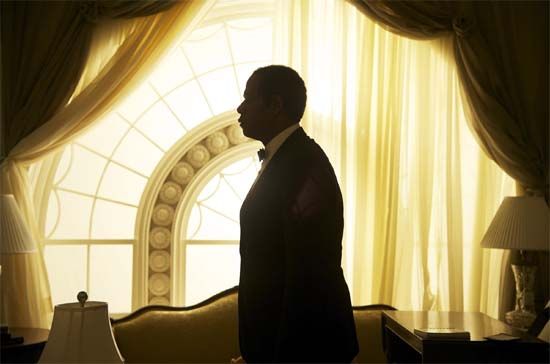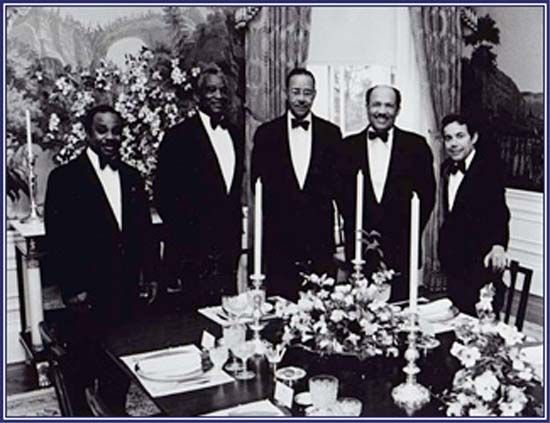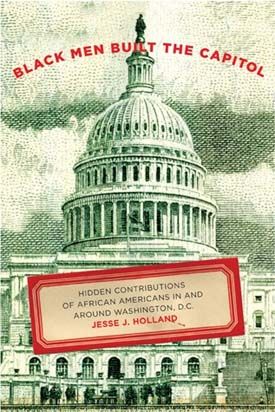On August 16, Lee Daniel’s The Butler, a star-studded film from The Weinstein Company, who also brought us Fruitvale Station, will hit the nation’s movie screens.
Based on the real life story of Eugene Allen, a black man born in 1919, who was hired to work in the White House in 1952, rose to the rank of butler and then to the top rank of Maître d’hôtel, served under eight Presidents. Allen, who retired in 1986, lived to see Barack Obama take office, and was a special guest at the inauguration.
Butlers in the Family Dining Room, c. 1975. Eugene Allen (second from right) worked from 1952 to 1986 as a pantryman, butler, and maître d’. He recalled, “I had a good relationship with all the butlers. You know, it’s closer than your relatives, because you work so close together. You see them every day. You eat together, you work together. It’s every day.”
He died March 31st, 2010 at the age of 90.
The Washington Post covered Allen, back in 2008, A Butler Well Served by This Election . Wil Haygood, who wrote the original WaPo feature, has expanded his article to book length, The Butler: A Witness to History.
Two friends in NYC, who went to pre-screenings have called me to encourage me to go see it. Both are black. Both, like me, have grandparents who worked “in service” all their lives. Both, like me, are descended from enslaved people in the DC, Maryland, Virginia area.
The calls prompted me to think about slaves and domestic labor for white folks, and how I feel about the long line of black actors and actresses who have portrayed those roles on the silver screen, and the stage, and the reality of the real life labors of folks from my family and community.
I still haven’t gone to see “The Help” and I won’t, since it was a star turn for a white actress with the black domestic help as props. I don’t begrudge Octavia Spencer, her Oscar. I loved her performance in Fruitvale Station.
I’ll make up my mind about going to see The Butler, in a week or two. There is no question that it will elicit commentary from a wide range of critics and pundits of all colors. The film is already the subject of a boycott by a vet group (highly touted by Fox News – which I won’t link to) who are outraged that Jane Fonda is cast as Nancy Reagan.
Though many people don’t think consciously each day about the history of enslaved African-Americans and their intimate connection to the building of this nation, the nation’s capitol, the nation’s Presidents (12 of whom were slave owners) and the decades of service work that continues (and is also the foundation of what is now “the black middle class”) it is rarely far from my thoughts.
I have ancestors who were owned by James Madison who worked at his Oak Hill plantation in Loudoun County VA. The aunt who raised my mom was a domestic for a wealthy DC family who owned Woody’s – a big DC Department store. My grandmothers – one black, one white, were domestics. My grandfathers worked “in service”, one as a chauffeur, the other as a Pullman Porter. I can’t tell you how outraged I was (and still am) when Governor Jerry Brown of CA vetoed the Domestic Worker’s Bill of Rights legislation in California, which has again been passed in the legislature.
I remember living in D.C. and launching its first black-controlled public radio station, WPFW-FM. We hit the airwaves with Duke Ellington. Duke’s father, James Edward worked as a butler.
As the butler, J. E. made the decisions around the Cuthbert house and oversaw the activities of the cook and maid. He also catered many of the parties Cuthbert threw for his well-placed friends and associates. Mercer Ellington remembers both his grandparents helping prepare food for these occasions. They also worked with other family members for different caterers, including on one occasion, a reception at the White House.
Being in service to Washington society had another (albeit minor) benefit for the Ellingtons. Their employer would pass on to them used household articles, generally of good quality. Over time the family owned fine secondhand sets of silverware and china. “Maybe we never had a complete genuine set,” Mercer stated, “but all the silver was first class.” He said that both his father and grandfather had an extensive knowledge of glassware, china, and silver.
There were excellent cooks in the family, and dinners at home tended to be quite grand. Mercer noted that the table was always set like one of the many elegant functions his grandfather had butlered. “This you might say is where the `Dukedom’ began,” Mercer recalled, “his experience of being around when his father was working for splendid people.” Ellington himself remembers being pressed into duty as a page at one of these functions, when the boy who usually performed this task was unavailable.
I daily think about the tsunami of racial hatred evoked by the ascension to the Presidency and occupation of the White House, by a black man and his family. The irony abounds, since those who know our history also know we built the damned place.
We are okay in the eyes of racists, as long as we stay in our place. Serving them.
Building for them. Working for them, but never, ever ever elevated above them.
I look backed recently at a piece Democracy Now did around the time of Barack Obama’s first election.
How Slaves built the Capitol and White House
Amy Goodman conducted an extensive interview with Jesse J. Holland, the author of “Black Men Built the Capitol: Discovering African-American History In and Around Washington, D.C”
Millions of people visit the National Mall, the White House, and the U.S.
Capitol each year. If they only hear the standard story, a big question remains:
“Where’s the black history?”Packed with new information and archival photos, Black Men Built the Capitol
answers this question. In this thoroughly researched yet completely accessible volume, Washington insider and political journalist Jesse J. Holland shines a light
on the region’s African-American achievements, recounting little-known stories
and verifying rumors, such as:
• Enslaved black men built the Capitol, White House, and other important
Washington structures.
• Philip Reid, a thirty-nine-year-old slave from South Carolina, cast and helped
save the model of the Statue of Freedom that sits atop the Capitol Dome.
• The National Mall sits on the former site of the city’s most bustling slave market.
• The grounds that are now Arlington National Cemetery were, from 1863 to
1888, a self-sustaining village for former slaves called the Freedman’s Village.
My stomach often flips a bit when I read official government papers relating to members of my family who were enslaved, though my heart swells with pride that they survived it, and went on to prosper, against all the odds. I remember when I was alerted to the emancipation papers for some of them in DC, dusty records at NARA which have finally been made available online.
To the Commissioners under the act of Congress approved the 16th of April, 1862, entitled “An act for the release of certain persons held to service or labor in the District of Columbia.”
Your Petitioner, Hugh W. Throckmorton of Washington City D.C. by this his petition in writing, represents and states, that he is a person loyal to the United States, who, at the time of the passage of the said act of Congress, held a claim to service or labor against the following persons of African descent of the names of Lewis Sipio, Solomon Ford, Henry Weaver, Patsy Jackson, John Jackson, Dennis Weaver, Winney Ford and Joseph Ford for and during the life of said Persons and that by said act of Congress said Persons was discharged and freed of and from all claim of your petitioner to such service or labor; that at the time of said discharge said Lewis Sipio was of the age of Thirty Years and of the personal description following:(1) Light Coloured, Solomon Ford Twenty Nine Years of a Dark Coloured, Henry Weaver aged Twenty Six Years, Dark Coloured Patsy Jackson, aged Twenty two years, Dark Coloured John Jackson aged Eight Months. Light Coloured Dennis Weaver aged Eighteen years. Dark Coloured Winney Ford aged Sixteen years, Dark Coloured and Joseph Ford aged fifteen years. Dark Coloured all very healthy and No defect excepting Henry Weaver who has a Broken Leg; and at Present Writing on Crutches but improving
It enrages me to see a dollar value sought for them by their current “owner”.
That your petitioner’s claim to the service or labor of said Negroes was, at the time of said discharge therefrom, of the value of Seven thousand three hundred fifty Dollars dollars in money.(3) as follow to Wit. Lewis 1200$ Solomon 1400$. Henry 400$ Dennis 1150$ Joseph 1000$ Patsy 1000$ John 100$ and Winney 1100$. They all Being healthy, Young and Good Workers and no defect except Henry, as aforesaid, and that to the Best of My Knowledge and Belief they have no moral mental or bodily infirmities or defects except in the case as stated in Henry.
Such is our history.
So many people visit Arlington Cemetery each year and don’t know the story of Freedman’s Village.
We come from a long line of butlers, cooks, nannies, maids, field hands, porters, laundresses and sharecroppers who struggled to get us to where we are today.
We are not far removed from that history, and in fact it continues into our present, with the battles for jobs, the vote and against our systematic incarceration.
We can’t forget either that behind the images offered to us on the big screen, are the lives of very real people, upon whose shoulders we stand today.
Cross-posted from Black Kos



36 comments